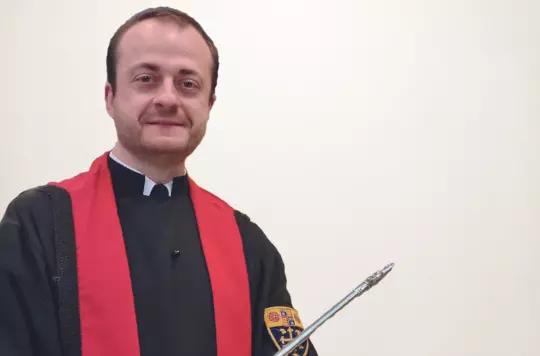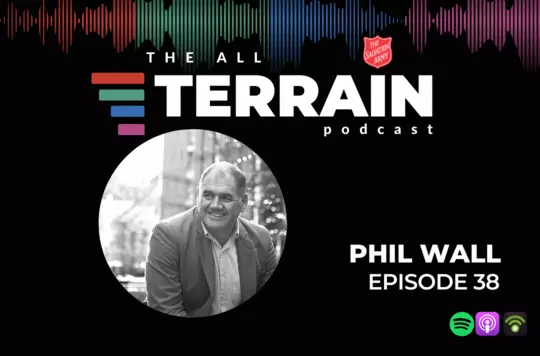8 May 2023
Hear my voice: Do you know the Lord?
Major Liv Raegevik-Slinn
Major Liv Raegevik-Slinn encourages us to have unwavering trust in the Lord.
Key text
Our study passage is taken from the longest chapter in the whole Bible. Still, I would recommend starting this study by reading the entire psalm. Also, read it slowly. Notice what is on the heart of the psalmist. Hear his voice. Pause and think. Listen to your own heart and, as the psalm draws you in, recognise your own responses.
Pause and reflect
- To what extent does reading the Bible attract you?
- How do you feed your soul from it?
The Psalms are poetic writings. They have rhymes of thought rather than of words. Psalm 119 is a special work of art, where the text is divided into sections, each starting with a letter of the Hebrew alphabet. These verses are songs of prayer and praise. They express the language of the soul, which is richer than words. Therefore, they have a timeless attraction for God’s people.
In my initial encounter with this text, I interpreted it as an expression of despair – ‘hear my voice’ (v149), ‘look on my suffering and deliver me’ (v153), ‘many are the foes who persecute me’ (v157). By reading the whole hymn, however, I understand its unknown author better. I realise that his theme is not hopelessness, but unwavering trust in the Lord.
By reminding himself about God’s protective law, his covenantal promises and his faithful ways with his people, the psalmist sustains his faith. His way of approaching God is not escapism from the raw reality of life. His enemies are real, and their threats against God’s people are dreadful. Yet he is convinced that God has not forgotten to be God and states: ‘I have put my hope in your word’ (v147), ‘you are near, Lord’ (v151), ‘all your words are true; all your righteous laws are eternal’ (v160).
Pause and reflect
- How might you identify with these prayers?
- What informs your prayers?
When praying for help, the psalmist presents himself as a true and faithful worshipper of God: ‘I have not forgotten your Law’ (v153). He promises to keep the Lord’s statutes (v146). He also has a word to say about those who don’t: ‘Salvation is far from the wicked, for they do not seek out your decrees’ (v155). This looks like bargaining with God. Is the psalmist praying only to achieve his self[1]protective favours with the Lord? In fairness, don’t we all pray and worship with mixed motives? We all tend to use prayer as a means to an end. God must be hearing a lot of voices that are out of harmony with his own.
Also, the psalmist sees answers to prayers as conditional and selective. He believes that God will remain faithful to his word and act according to his laws and not to human premises. That view may clash with our understanding of God as one who would embrace all humankind in his mercy. We have an expectation of our Father in Heaven to be compassionately attentive to all the voices that cry out their human desperation, don’t we?
We are not God, and he doesn’t need our advice presented as prayers. We can simply trust him to deal with the desperate cries from those who know him, and those who don’t, because there is salvation in calling on his name. In his letter to the Romans, Paul writes: ‘The same Lord is Lord of all and richly blesses all who call on him, for: “Everyone who calls on the name of the Lord will be saved”’ (10:12 and 13). Can we think of a better condition for reaching God than this?
Pause and reflect
- How has God answered your anxious prayers?
- What else might the Lord want to do for you?
Prayer to God is so much more than a means to an end. For the psalmist it is not about any better outcome than knowing God. His praying is relational. He knows his Lord, and the Lord knows him and so the communication between them can flow freely. God has more to do in the life of the psalmist, and the psalmist longs to worship the Lord for ever. Prayer is the catalyst.
Psalm 119 lifts prayer and praises to a level where deep satisfaction in God becomes a reality. Rather than turning away from God’s statutes, the psalmist testifies to the fact that he is being drawn towards them. He bursts into praises over them. He discovers the blessing of obedient response. His faith matures by it, so he can hold on to God’s promises.
The psalmist might teach us a lesson here that would be about seeking to go deeper into God’s word. A Bible verse on an app might be fine on a good day, but not sufficient to sustain us in the long run. Like the psalmist, we too need to be assured of our salvation in the Lord. It is only those who live by God’s word who can give glad and confident witness about their Lord and Saviour.
If the psalmist faced enemies in his days, God’s people today will certainly also face their tribulations. The psalmist shows us that our best hopes are in God himself. To know the Lord means to love and obey his commandments and be confident in his care. So, the ‘hear my voice’ prayer is God’s cry to us as much as it is our cry to him.
Pause and reflect
- What have you heard from God through this study?
- What will your response to him be?
Bible study by

Major Liv Raegevik-Slinn
Territorial Candidates Support Officer, William Booth College
Discover more

Andrew Campbell, a verger at Westminister Abbey, explains how his faith and work are intertwined.

This Open Learning course explores the psalms of the Old Testament to prompt reflection on Christian life and support practical ministry.

Host Jo Taylor is joined by Phil Wall for this month's hypothetical hike.

